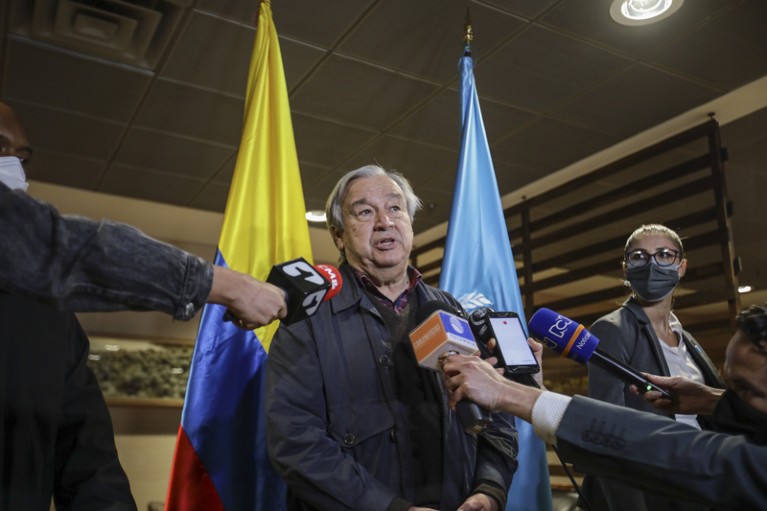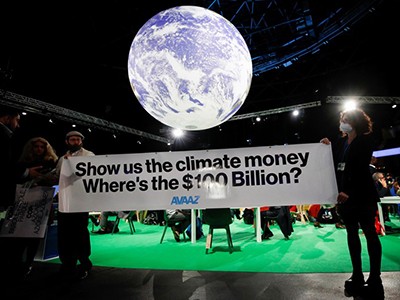
UN secretary-general António Guterres announced plans for a new science board in September, but is yet to release further details.Credit: Juancho Torres/Anadolu Agency/Getty
Scientists helped to create the United Nations system. Today, people look to UN agencies — such as the UN Environment Programme or the World Health Organization — for reliable data and evidence on, say, climate change or the pandemic. And yet, shockingly, the UN leader’s office has not had a department for science advice for most of its 76-year history. That is about to change.
UN secretary-general António Guterres is planning to appoint a board of scientific advisers, reporting to his office. The decision was announced in September in Our Common Agenda (see go.nature.com/3y1g3hp), which lays out the organization’s vision for the next 25 years, but few other details have been released.
Representatives of the scientific community are excited about the potential for science to have a position at the centre of the UN, but are rightly anxious for rapid action, given the twin challenges of COVID-19 and climate change, which should be urgent priorities for the board. The International Science Council (ISC), the Paris-based non-governmental body representing many of the world’s scientists, recommended such a board in its own report on science and the intergovernmental system, published last week (see go.nature.com/3rjdjos). Council president Peter Gluckman, former chief science adviser to New Zealand’s prime minister, has written to Guterres to say the ISC is ready to help.
COP26 didn’t solve everything — but researchers must stay engaged
But it’s been more than two months since the announcement, and the UN has not yet revealed the names of the board members. Nature spoke to a number of serving and former UN science advisers who said they know little about the UN chief’s plans. So far, there are no terms of reference and there is no timeline.
Nature understands that the idea is still being developed, and that Guterres is leaning towards creating a board that would draw on UN agencies’ existing science networks. Guterres is also aware of the need to take into account that both the UN and the world have changed since the last such board was put in place. All the same, the UN chief needs to end the suspense and set out his plans. Time is of the essence.
Guterres’s predecessor, Ban Ki-moon, had a science advisory board between 2014 and 2016. Its members were tasked with providing advice to the secretary-general on science, technology and innovation for sustainable development. But COVID-19 and climate change have pushed science much higher up the international agenda. Moreover, global challenges are worsening — the pandemic has put back progress towards the UN’s flagship Sustainable Development Goals (SDGs), a plan to end poverty and achieve sustainability by 2030. There is now widespread recognition that science has an important part to play in addressing these and other challenges.
How science can put the Sustainable Development Goals back on track
Research underpins almost everything we know about the nature of the virus SARS-CoV-2 and the disease it causes. All countries have access to similar sets of findings, but many are coming to different decisions on how to act on those data — for example, when to mandate mask-wearing or introduce travel restrictions. The UN’s central office needs advice that takes this socio-cultural-political dimension of science into account. It needs advice from experts who study how science is applied and perceived by different constituencies and in different regions.
Science advice from the heart of the UN system could also help with another problem highlighted by the pandemic — how to reinvigorate the idea that it is essential for countries to cooperate on solving global problems.
Climate change is one example. Advice given by the Intergovernmental Panel on Climate Change (IPCC) is being read and applied in most countries, albeit to varying degrees. But climate is also an area in which states are at odds. Despite Guterres’s calls for solidarity, there were times during last month’s climate conference in Glasgow when the atmosphere was combative. Science advisers could help the secretary-general’s office to find innovative ways to encourage cooperation between countries in efforts to meet the targets of the 2015 Paris climate agreement.
Reset Sustainable Development Goals for a pandemic world
The SDGs are also, to some extent, impeded by competition within the UN system. To tackle climate change, manage land and forests, and protect biodiversity, researchers and policymakers need to work collegially. But the UN’s scientific bodies, such as the IPCC, are set up along disciplinary lines with their own objectives, work programmes and rules, all guided by their own institutional histories. The IPCC and the Intergovernmental Science-Policy Platform on Biodiversity and Ecosystem Services (IPBES), for example, have only begun to collaborate in the past few years .
Independence will be key for an advisory role to be credible. Guterres needs to consider an organizational architecture through which UN agencies are represented, and funding could come from outside the UN. But all of those involved would have to accept that their contributions were for common goals — not to promote their own organization’s interests.
Leadership matters, as do communication and support. Guterres should ensure that his scientific advisers are chosen carefully to represent individuals from diverse disciplines and across career stages, and to ensure good representation from low-income countries. The board needs to be well staffed and have a direct line to his office. And it will need a decent budget. Guterres should quickly publish the terms of reference so that the research community has time to provide input and critique.
At its most ambitious, a scientific advisory board to the secretary-general could help to break the culture of individualism that beleaguers efforts to reach collective, global goals, and bring some coherence to the current marketplace of disciplines, ideas and outcomes. This will be a monumental task, requiring significant resources and the will to change. But if the advisers succeed, there will also be valuable lessons for the practice of science, which, as we know all too well, still largely rewards individual effort.

 COP26 didn’t solve everything — but researchers must stay engaged
COP26 didn’t solve everything — but researchers must stay engaged
 Ending Hunger: Science must stop neglecting smallholder farmers
Ending Hunger: Science must stop neglecting smallholder farmers
 Reset Sustainable Development Goals for a pandemic world
Reset Sustainable Development Goals for a pandemic world
 How science can put the Sustainable Development Goals back on track
How science can put the Sustainable Development Goals back on track





